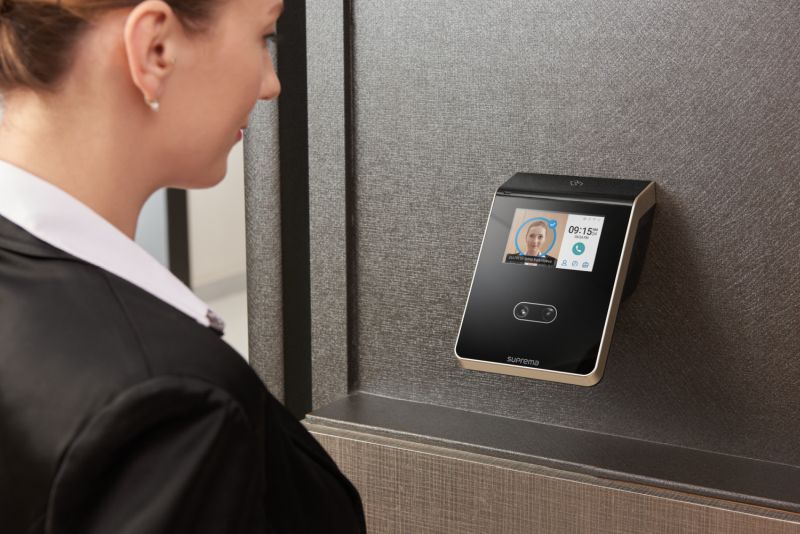Facial Recognition Kelio adjunctTime & Attendance Solutions

New Facial Recognition option added to Bodet’s Clocking In Systems giving organisations even more choice and flexibility
Bodet is proud to announce the integration of the new FaceStation 2 terminal into its Time & Attendance Systems, offering facial recognition as a simple and effective method for collecting attendance data from your workforce.
This contactless facial recognition terminal will sit amongst Bodet’s other Clocking In Solutions, giving our customers even more choice and flexibility with options which can be combined depending on their requirements. Bodet’s Clocking In Systems include proximity terminals, smartphone and virtual clocking in via PC.
If you would like more information on our Clocking In Systems, please contact us.
Bodet Launches Facial Recognition to Complement Kelio Time & Attendance Solutions
FaceStation 2 is the latest biometric clocking-in user interface to be incorporated into Bodet’s innovative Time and Attendance Systems. Working in conjunction with Bodet’s Kelio Visio X7 interactive clocking terminal, FaceStation 2 is the most advanced face recognition clocking terminal and complements Bodet’s fingerprint scanners.
Biometric scanners are the most reliable method of collecting employees’ working hours, as they rule out the possibility of buddy punching, where staff can use fellow employees’ identity cards or fobs to clock in for them. Facial recognition is ideal for manufacturing or agricultural industries where working conditions may compromise accurate recognition of finger prints. Being contactless, facial scanners are also more hygienic should contagion be an issue such as in the current Coronavirus pandemic.
FaceStation 2 uses infrared illumination which allows accurate facial recognition regardless of indoor lighting conditions. The facial image is analysed in order to extract specific characteristics which are compared against a stored profile to identify the employee. As with Bodet’s fingerprint scanners, all stored files are not images, but encrypted algorithm templates which are compared to the scanned image to confirm identity. This ensures data security and conformity to Data Protection and GDPR legislation. Once identified, a time-stamped record is generated and transmitted to Bodet’s Kelio Time & Attendance software hosted locally or in the cloud. This gives a real-time indication of attendance, and allows the generation of daily reports which can be accessed by authorised personnel and made available for payroll. This allows management teams to have accurate data for performance management at every level and can assist in identifying trends at an early stage.
Once identified, a time-stamped record is generated and transmitted to Bodet’s Kelio Time & Attendance software hosted locally or in the cloud. This gives a real-time indication of attendance, and allows the generation of daily reports which can be accessed by authorised personnel and made available for payroll. This allows management teams to have accurate data for performance management at every level and can assist in identifying trends at an early stage.
FaceStation2 integrates with the Kelio Visio X7 terminal which incorporates a range of interactive functions designed to assist employees and HR staff in their daily activities. In addition to staff attendance, the Kelio Visio X7 term21al can allow employees to review their remaining holiday time, request leave, access their personnel reports, and send and receive personal messages directly at the terminal.
Bodet’s managing director, Richard Manby commented, “We are delighted to announce this latest development to our comprehensive range of clocking in systems. Kelio X7 is customisable so can be tailored to meet specific requirements, while its inherent flexibility means it can benefit a wide range of industries from manufacturing and logistics to care homes and customer service centres. The addition of facial recognition now provides even greater functionality to what is probably the most versatile time and attendance system available.”


































